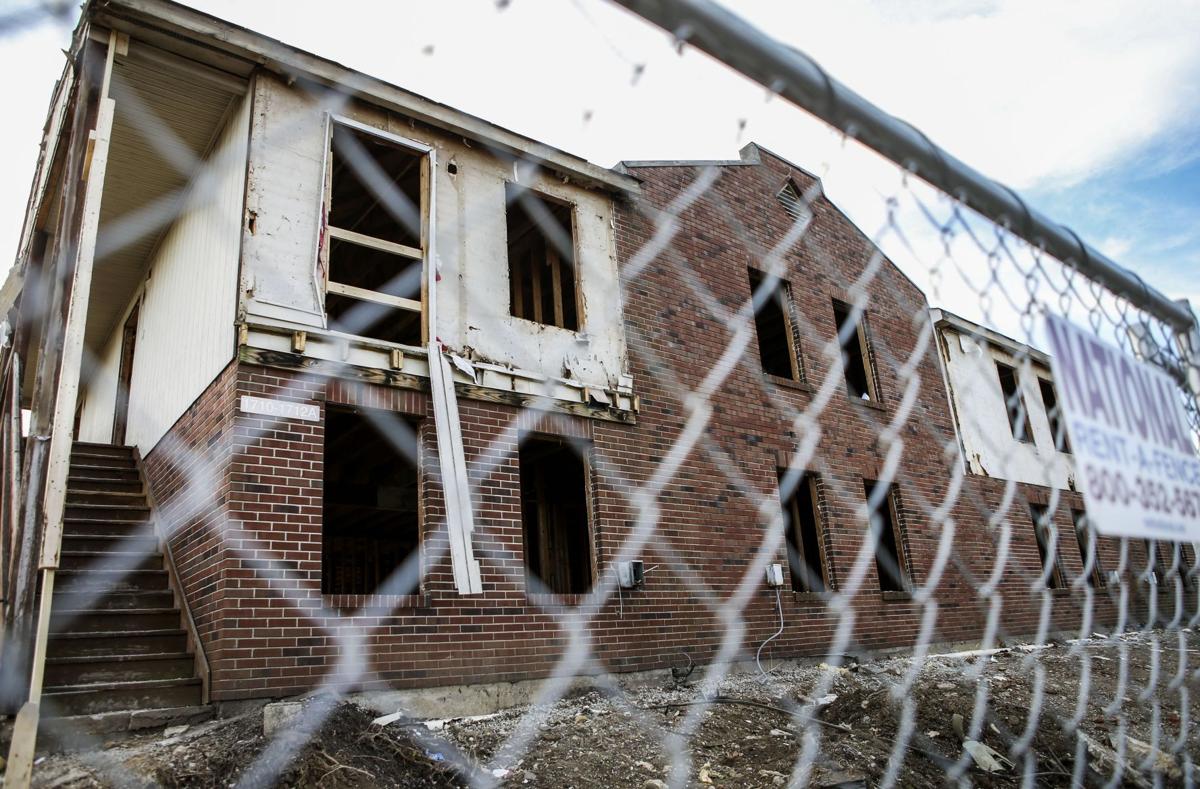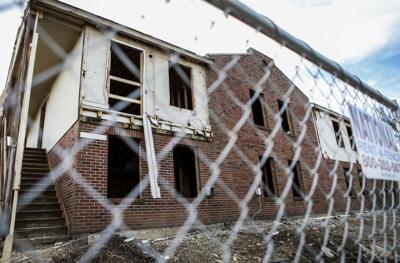ST. LOUIS ŌĆö Executives of one of the nationŌĆÖs largest affordable housing developers, ensnared in a bitter feud with a powerful ├█č┐┤½├Į political family, are now saying that the family wanted legal control over some investment decisions at a key north side housing complex renovation.
In a no-holds-barred interview on Wednesday, the top executives of ├█č┐┤½├Į-based McCormack Baron Salazar blasted Rodney Hubbard Sr., the nonprofit Carr Square Tenant Management Corp. that he runs, HubbardŌĆÖs daughter, Alderman Tammika Hubbard, and their attorneys, for trying to insert themselves into decision-making on the project.
Carr Square was also seeking a 7.5% cut of McCormackŌĆÖs development fees. But that wasnŌĆÖt the holdup, the executives said.
ŌĆ£ItŌĆÖs never been about the money,ŌĆØ McCormack President Vincent Bennett said in an interview with the Post-Dispatch editorial board on Wednesday. ŌĆ£ItŌĆÖs never been about the fees. ItŌĆÖs been about control, and through extension, concerns that (Tammika Hubbard) had about where and how the grant was going to be directed and utilized.ŌĆØ
People are also reading…
ŌĆ£If it was just about the money,ŌĆØ he added, ŌĆ£weŌĆÖd be done.ŌĆØ
The HubbardsŌĆÖ attorneys fired back on Thursday, outright denying the developerŌĆÖs story.
Neither the Hubbards nor their attorneys ever sought legal control over project money, said Stone Leyton & Gershman attorney Bill Clendenin, who represents Carr Square. He called McCormackŌĆÖs assertions ŌĆ£a very troubling mischaracterization of Carr SquareŌĆÖs position.ŌĆØ
The dispute continues to shed light on powerful interestsŌĆÖ efforts to profit from the development of the near north side, long a poor area of the city, but whose stock is rising now that the National Geospatial Intelligence AgencyŌĆÖs western headquarters is under construction there.
The rift between McCormack Baron, which has already begun renovations on the 675-unit low-income Preservation Square community, and the Hubbards spilled into public view late last year, four years after ├█č┐┤½├Į won the $30 million Choice Neighborhoods grant from the U.S. Department of Housing and Urban Development. Alderman Hubbard sponsored a bill barring construction permits in the project footprint ŌĆö though it never received a hearing. She has also refused, McCormack officials say, to introduce bills vacating a city street in Preservation Square and granting property tax abatement to the project, a common development subsidy, particularly for low-income housing.
McCormack is one of the nationŌĆÖs largest affordable housing developers, financing its projects mainly with federal grants and tax credits. Its co-founder, Richard Baron, has a long history on the near north side, first representing tenants as a young legal aid lawyer during the rent strike of 1969 and later redeveloping former public housing sites there. He said he actually drew up the original incorporation papers of Carr Square Tenant Management Corp., which was designed to organize public housing tenants following the rent strike.
The HUD grant, combined with tens of millions of dollars worth of state and federal low-income housing tax credits McCormack has won, is supposed to help finance the Preservation Square project as well as pay for social services in the neighborhood. The project began construction last summer and is a top priority of the city, which is administering the HUD grant.
McCormack 40 years ago partnered with Carr Square, before it was controlled by Rodney Hubbard Sr., in the original construction of Preservation Square, then known as OŌĆÖFallon Place. McCormack officials said they were open to a partnership on the current redevelopment so some money could be put into neighborhood programming.
ŌĆśWhat are you talking about?ŌĆÖ
Bennett, McCormackŌĆÖs president, said negotiations broke down when CarrŌĆÖs attorneys asked for ŌĆ£veto and approval rightsŌĆØ over some of the projectŌĆÖs financial transactions.
ŌĆ£There were a lot of other controls that were requested by CarrŌĆÖs attorneys that, we just said, weŌĆÖll never get there,ŌĆØ he said. ŌĆ£At every turn, the issues come back to control of the grant, control of the resources, and some understanding or misunderstanding that these are frankly federal funds between HUD and the city.ŌĆØ
Clendenin, CarrŌĆÖs attorney, provided several drafts of an agreement between the two sides from early 2020 suggesting that some of the dispute revolved around whether Carr Square would be able to approve McCormackŌĆÖs future development agreements. The drafts, the last of which was sent in March 2020, indicate that the controls Carr Square sought were over the payment of the sub-development fee to Carr Square ŌĆö estimated at $169,000 of the $2.25 million McCormack expected in developer fees on the first phase.
McCormack would get Carr SquareŌĆÖs cooperation in vacating streets, zoning and tax abatement ŌĆö all actions that in ├█č┐┤½├Į, an areaŌĆÖs alderman informally controls.
Carr Square in return wanted to be able to approve any new agreements proposed by McCormack that would prohibit the payment of the sub-development fee. It also wanted language removed that subjected Carr SquareŌĆÖs payment to approval by HUD and the city.
Clendenin said that provision ŌĆ£was defensive in nature.ŌĆØ Carr Square didnŌĆÖt want McCormack Baron to divert fees due to Carr Square through sub-development agreements.
Another issue: Carr Square wanted its portion of the development fee ŌĆ£up front,ŌĆØ said Baron, the companyŌĆÖs chairman.
ŌĆ£And we said, ŌĆśWhat are you talking about?ŌĆÖŌĆØ Baron said. ŌĆ£ŌĆÖYouŌĆÖll get your funds when we get our funds.ŌĆÖ We basically said, ŌĆśListen guys, this is the way the world works. You understand this very well.ŌĆÖ Stone Leyton & Gershman has done all kinds of tax credit jobs.ŌĆØ
But Clendenin said Carr Square had been burned by McCormack before. Receiving the fees up front, he said, gave Carr the ŌĆ£best chance at actually receiving the development fee.ŌĆØ
Nor could the two sides agree on whether Carr Square even still had an ownership interest in the Preservation Square property. McCormack maintains that Carr SquareŌĆÖs interest was reduced in past refinancings of the property. Carr Square repeatedly insisted that its ownership interest should be purchased ŌĆö though a dollar figure still needed to be negotiated, according to the drafts.
While negotiations were ongoing, Clendenin said McCormack ŌĆ£was actively trying to eliminate Carr SquareŌĆÖs ownership interest in Preservation Square.ŌĆØ
When financing for the project ultimately closed last summer, the property was transferred to a company controlled by the cityŌĆÖs economic development arm ŌĆö the ├█č┐┤½├Į Development Corporation. SLDC says the structure was only designed to lower McCormackŌĆÖs federal income tax burden.
Carr School
Among the HubbardsŌĆÖ biggest complaints are that plans never moved forward to rehab Carr School, two blocks south of Preservation Square, and turn it into a community center. McCormack said thatŌĆÖs because the structure is in such poor shape that HUD later decided that Choice grant funds couldnŌĆÖt be put toward it.
Baron and Bennett maintained that they wanted to develop a community center and tried to find another way. Carr School is owned by Carr Square. The ground surrounding it is owned by NorthSide Regeneration, the Paul McKee-led effort to compile property in north ├█č┐┤½├Į, in which Carr Square is partner. Plans to renovate the school had to involve NorthSide. Baron and Bennett said they met several times to discuss alternatives with McKee, Rodney Hubbard and Steve Stone, NorthSideŌĆÖs attorney and a partner in Stone Leyton & Gershman.
ŌĆ£Tammika Hubbard never sat in a single meeting we had about the community center,ŌĆØ Baron said. ŌĆ£Never. Not one. Would not talk to us. I asked Rodney repeatedly, why isnŌĆÖt Tammika at the table? This is her ward. IsnŌĆÖt she interested in this community center?ŌĆØ
Tammika Hubbard confirmed via email she didnŌĆÖt attend those meetings. But she said she didnŌĆÖt believe McCormack was acting in good faith to find another development plan for the community center. McCormack, she said, ŌĆ£trickedŌĆØ her and her constituents about the school.
McCormack has worked on multiple HUD Choice grants across the country, she said. ŌĆ£They knew the rules,ŌĆØ she wrote. ŌĆ£MBS brought renovation of the school to the table for a state-of-the-art community center. Then almost four years later they said that it was not allowable.ŌĆØ
Baron said Carr School talks broke down after Stone Leyton attorneys continued to push for legal rights over the private development agreements required to bring on tax credit investors. He wasnŌĆÖt about to let an outside party insert itself into the project like that, he said.
ŌĆ£Every time we got down to having an agreement, the lawyers for Carr Square kept adding specific requirements on our part giving them control over this or that and made it so impossible to try and work this out that finally I just decided it wasnŌĆÖt worth the time,ŌĆØ Baron said.
Regardless, Baron and Bennett say theyŌĆÖre still interested in helping to develop a community center in the area. TheyŌĆÖre currently looking at the Elkay building next to Carr School, now owned by nonprofit Justine Petersen.
Bottom line, said the McCormack executives: The Hubbards and their lawyers canŌĆÖt stop the Preservation Square project.
If they think theyŌĆÖve been cheated, Bennett suggested, they could always sue.
ŌĆ£Obviously they have other recourse they could always have sought, legal or other,ŌĆØ he said. ŌĆ£ThatŌĆÖs not been sought.ŌĆØ






















